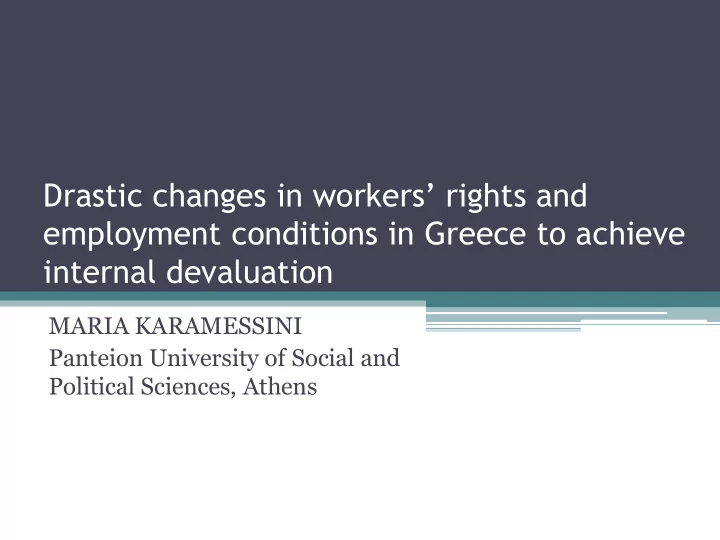

Drastic changes in workers’ rights and employment conditions in Greece to achieve internal devaluation MARIA KARAMESSINI Panteion University of Social and Political Sciences, Athens
Economic adjustment programme (EAP) • Since 2010 huge fiscal consolidation programme (21.4% of GDP) – Included in the EAP that accompanies the two loan packages received by IMF + Eurozone partners. • Sweeping changes in the wage-setting system and the emloyment regime supervised by the troika. Meant to reduce nominal wages and labour costs in the business sector of the economy in order to to achieve internal devaluation – second most important goal of the EAP. • Austerity and internal devaluation policies responsible for a state-led recession of historical dimensions (24% loss of GDP) - inconceivable levels of unemployment (28%) rampant impoverishment of the population (35%)
Internal devaluation: logic and targets • Wage devaluation reduces nominal labour costs and leads to price devaluation which restores competitiveness and curbs the external deficit (18% of GDP in 2008). • EAP’s explicit target : 15% reduction in nominal unit labour cost in 2012-14 (implicit target 20% for 2010-4). • Implicit assumptions : labour costs are an important determinant of price competitiveness, wage reductions are transmitted to prices, demand for exports has high price-elasticity • All implicit assumptions have been challenged in literature and public debate at home and also by European institutions (ECB, European Commission, social partners). Labour costs weak contribution to inflation before the crisis (driven by profits and expanding demand) . Structural non-price competitiveness, exchange rate of the Euro very important for the big current account deficit.
Employment regime changes: removing protection from both permanent and atypical employees Very large number of flexibility measures increasing employment and working time flexibility • Dismantling the strong employment protection of permanent employees (easing individual and collective dismissals) • Easing recourse of employers to atypical contracts • Making atypical contracts more flexible by reducing the protection of atypical employees Measures generalising employment precariousness in the current context of mass dismissals and exploding unemployment (no flexicurity approach)
Deregulation of wage-setting system and lowering of wage floors Dismantling collective bargaining system: suspension of collective bargaining on wages in public utilities, agencies and undertakings; sector and occupational collective bargaining weakened through derogations at the firm level; suspension of the extension of collective agreements to non- signatory firms by the Minister of Labour; changes in the mediation and arbitration system making it less supportive for unions, re- regulation of ‘after effects’ of collective agreements Reduction in wage floors – legislated reduction by 22% of national minimum wage, the national minimum wage now set by the government (not through collective bargaining as before) - a subminimum wage for young people has been established Social dialogue: Abandoned when social partners refused to reduce minimum wage through collective bargaining
Nominal wage devaluation (25.6%) without price devaluation – is deflation desirable or harmful? 2009 2010 2011 2012 2013 3.3 -8.9 -4.7 -7.6 -7.3 Nominal wages per head Private consumption deflator 0.7 4.0 3.4 0.9 -1.0 Nominal unit labour costs 6.4 -2.1 -1.1 -8.1 -7.8 Total economy 4.4 -1.1 -3.5 -12.3 -8.2 Business sector**
Reduction of current account deficit through fall in imports: impoverishment + de-investment TABLE 3: Greece. Selected economic indicators, 2008-13 2008 2009 2010 2011 2012 2013 percent change -4.0 Real GDP -0.2 -3.1 -4.9 -7.1 -6.4 -4.9 Public consumption -2.6 4.9 -8.7 -5.2 -4.2 -6.7 Private consumption 4.3 -1.6 -6.2 -7.7 -9.1 Gross fixed capital -14.3 -13.7 -15.0 -19.6 -19.2 -5.9 formation 2.5 Exports 1.7 -19.4 5.2 0.3 -2.4 -7.1 Imports 0.9 -20.2 -6.2 -7.3 -13.8 -3.5 Employment 1.4 -1.1 – 2.3 -6.1 -8.3 Unemployment (%) 7.7 9.5 12.6 17.7 24.7 27.0
Concluding remarks: • Dismantling of a fundamental pillar of the ESM in Greece: collective bargaining and social dialogue. The very existence of unions is also menaced. • Sharp decline in nominal wages and wage floors has led to collapse of living standards of employees and their families – destitution for those receiving the new minimum wage – young people unable to be financially independent from their parents. • Economic Adjustment Programmes and the troika are dismantling the European Social Model in Greece but also in other countries of the Eurozone periphery • Is this compatible with the values and goals of the EU? With its concern for social cohesion and preventing social dumping? Fragmentation of Europe
Recommend
More recommend